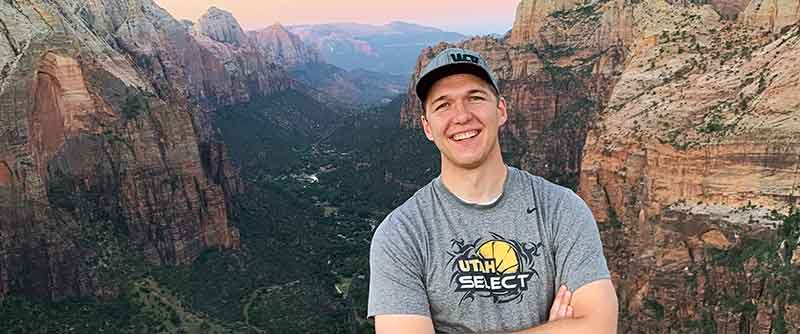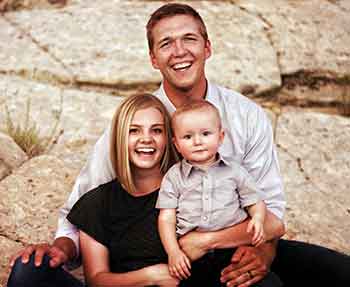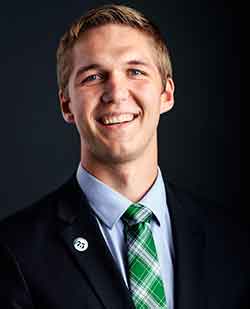
Boston Gubler
University of Colorado School of Medicine
 Growing up in La Verkin, Utah, Boston Gubler looked forward to business trips with his father. On the road to Las Vegas or the West Coast, Gubler’s father, a business owner and entrepreneur, gave his son tutorials on negotiating tactics and business theories.
Growing up in La Verkin, Utah, Boston Gubler looked forward to business trips with his father. On the road to Las Vegas or the West Coast, Gubler’s father, a business owner and entrepreneur, gave his son tutorials on negotiating tactics and business theories.
That was when Gubler decided he wanted to follow in his father’s footsteps and go into business himself. He dreamed of becoming an entrepreneur and make a million dollars by age 30.
Travel of a different sort upended that plan.
Gubler, a member of the Church of Jesus Christ of Latter-day Saints, volunteered for a two-year mission to southern Chile at age 19.
“I kind of went into it expecting some kind of life-changing experience, but I expected the changes to be more on a spiritual and emotional, getting-to-know yourself sort of level. I didn’t expect it to lead to a complete career change.”
The career shift occurred when Gubler and his mission partner met a man named Fernando, whose personal problems, including alcoholism, were ruining his life.
“I was near the end of my mission, and I was starting to think about what I wanted to do when I got home. As we worked with Fernando, I realized that what I like to do and am more interested in doing is helping people.”
 When he returned home, he enrolled at Utah Valley University and signed up for psychology courses. In his sophomore year he took a brain and behavior class to learn about the science of the brain.
When he returned home, he enrolled at Utah Valley University and signed up for psychology courses. In his sophomore year he took a brain and behavior class to learn about the science of the brain.
“I realized the things I loved learning about were the physical characteristics of the human body, not just the theory of the mind. That’s what put me on the path to choosing medicine.”
In his junior year, Gubler took a job as an orderly at Utah Valley Hospital.
“I thought it would be a good way to decide if it was something that I honestly could do. There were a couple things that were tough. I was in the recovery room and you often have to deal with the entire spectrum of bodily fluids and functions that people have. That was, in fact, one of my concerns about going into medicine. I needed to know if I could work with those kinds of things. It was uncomfortable at first but it didn’t bother me enough that I quit. I adapted soon enough and really enjoyed my job.”
An important part of the experience was proximity to physicians, who offered insights into their profession, and how they achieved a work-life balance. Gubler, 26, shadowed doctors in family medicine, anesthesiology, and gastroenterology.
“I got to see quite a bit and got some insights into what a physician’s life was like. I wanted to make sure that this was not just a passing interest. I had really helpful conversations.”
Gubler’s family has been supportive of his career change, which was not part of the plan when he and his wife, Megan, married four years ago.
“As a physician you can exercise enough control in what you choose as a specialty and what kind of life you lead,” said Gubler, the father of 1-year-old Luke. “I know it will be a fulfilling and happy career.”
Read About Our Students
Progress Asoluka — . Healthcare workers' neglect of his mother and younger sister spurred an interest in a health career.
Boston Gubler — .Befriending a stranger while on a mission in Chile prompted a change in career plans from business to medicine.
Bianca Sanchez — .A first-generation college graduate, Sanchez credits an internship with giving her confidence to pursue medicine.